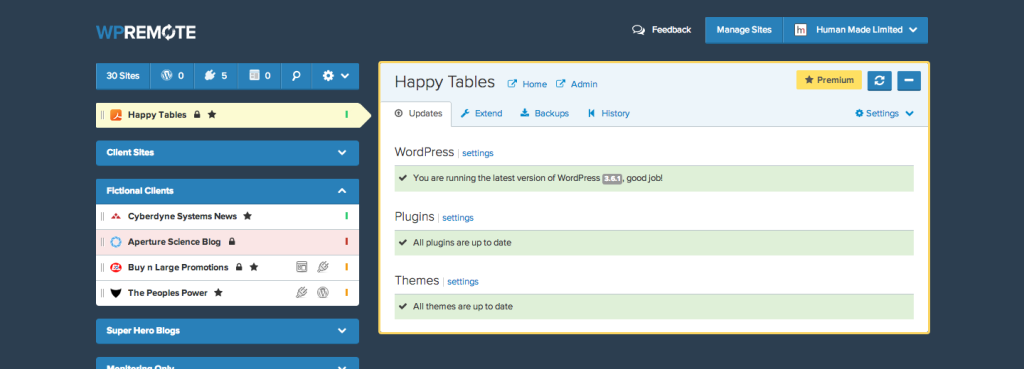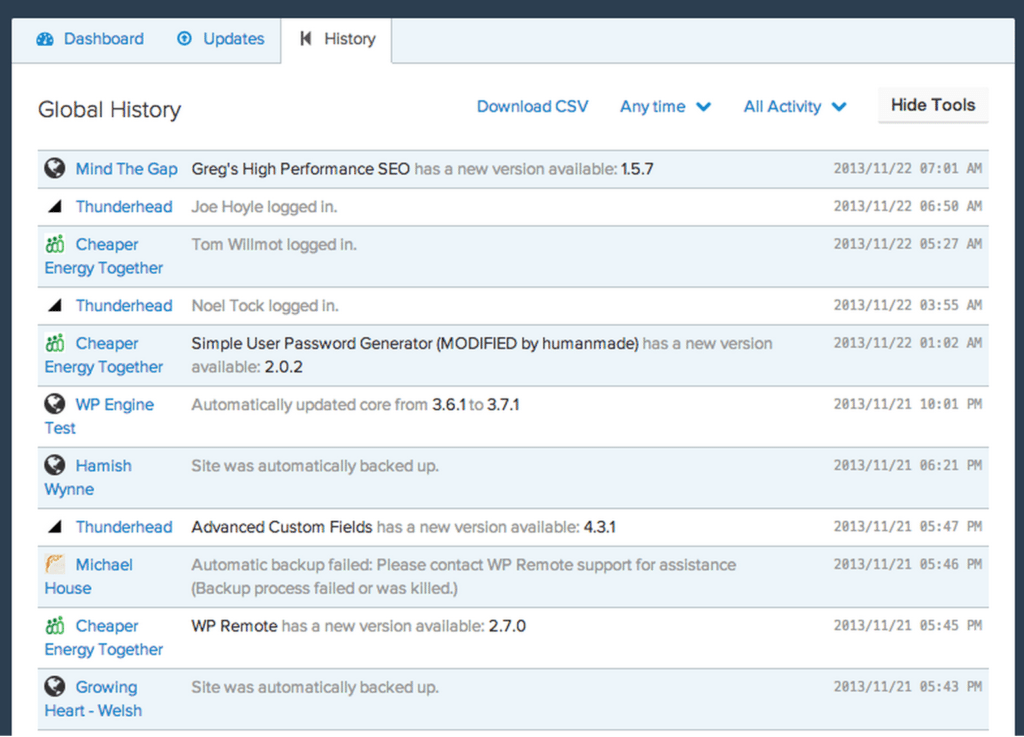WP Remote provides a great resource for those who have multiple WordPress sites to maintain. Created in 2010, this evolving web app allows users to monitor and update all of their WordPress sites in one place, saving time and effort for those who manage sites for clients.
Since announcing “The New WP Remote” on October 4—which marked the launch of their new premium features, a redesign, and the public release of their powerful API—the folks behind the scenes at WP Remote have been working hard to deliver even more improvements to the interface, all rolled out in the past week.
I had the chance to chat with the lead engineer on the recent release (and all of the updates since), Daniel Bachhuber, who took me through the latest changes. Among these are more durable backups for larger sites, integration with premium plugins and themes, and new API endpoints.
Also, along with being able to view the history across all of your sites at once (which is super helpful), users now have the ability—as of yesterday—to download this data as a CSV file. If you manage a bunch of sites, this could really come in handy for organization, documentation and client communications.
More Durable Backups
Some hosts kill PHP processes after 90 seconds, which was creating issues, so WP Remote built an implementation of their backup system that gets around that. What it does, basically, is divide the backup into many small parts and then performs the process one by one. And if the process ever gets killed, there is a restart mechanism.
Integration with Premium Plugins and Themes
WP Remote now integrates smoothly with Gravity Forms, BackupBuddy, Pagelines, and a few others. They are currently working on Easy Digital Downloads Add-Ons and Advanced Custom Fields Add-Ons.
Any plugin or theme that implements the ManageWP update mechanism, or hooks into what WordPress core does for updates, will work seamlessly with WP Remote. Also, users are encouraged to email WP Remote at to request testing of a premium plugin or theme integration.
API Endpoints
WP Remote is one of the few complex applications build exclusively on WordPress. Since its inception, it has been known as the interface that you come to in order to perform management actions. But what the WP Remote team at Human Made has really spent the majority of their time and efforts on is making their API more robust.
The application is built entirely on top of an API. This means that there is a corresponding API endpoint for any action that you perform within the application, that you can then build on top of on your own.
Daniel envisions that “the future of WP Remote is this API that gives you the opportunity to do lots of things.” He explained that users can “build different user experiences based on top of our API” and/or “take our API and run with it, using it for what they want.”
This past week Daniel and WP Remote pushed out some additional API endpoints that are content management endpoints, offering the ability for users to manage their posts, comments, and users.
Use Cases
One such use case for the API is a command for WP-CLI. WP-CLI is a command-line interface for WordPress. The WP Remote WP-CLI command enables you to run many WP-CLI commands against a remote site. Say, for instance, you have a site with a web host that doesn’t permit SSH access, and you subsequently install WP-CLI. With the WP Remote WP-CLI command, you can work around this restriction and perform many WP-CLI commands against a remote site from your local machine.
Another use case for the WP Remote API is the comment moderation web app they kicked off earlier this week. The web app will let WP Remote users approve and reply to a list of comments across all of their sites. Because of the substantial foundation that WP Remote provides, building a comment moderation web app is a straightforward task of HTML, CSS, and JavaScript.
Download History to CSV
Part of why WP Remote is useful is that it provides a history of all the actions you’ve performed across all of your sites, called a “global view.” What’s more, as I mentioned earlier, you can now download this information as a CSV file, which is easily sharable with clients.
One Month Free for Torque Readers
Along with all of these changes, inevitably, comes new price points:
• 1 Site for $5/month
• 25 Sites for $79/month
But if any of you are interested in trying out the app, just enter the code “torquemag” for 1 month free.
Anybody use WP Remote to monitor and update your sites? Tell us your thoughts in the comments below!
 Michelle Oznowicz is the Managing Editor of Torque. Whether it be directing a short film, planning a unique travel adventure, or pulling together and organizing a community-powered publication, she enjoys rallying a group of people around a common goal.
Michelle Oznowicz is the Managing Editor of Torque. Whether it be directing a short film, planning a unique travel adventure, or pulling together and organizing a community-powered publication, she enjoys rallying a group of people around a common goal.



No Comments